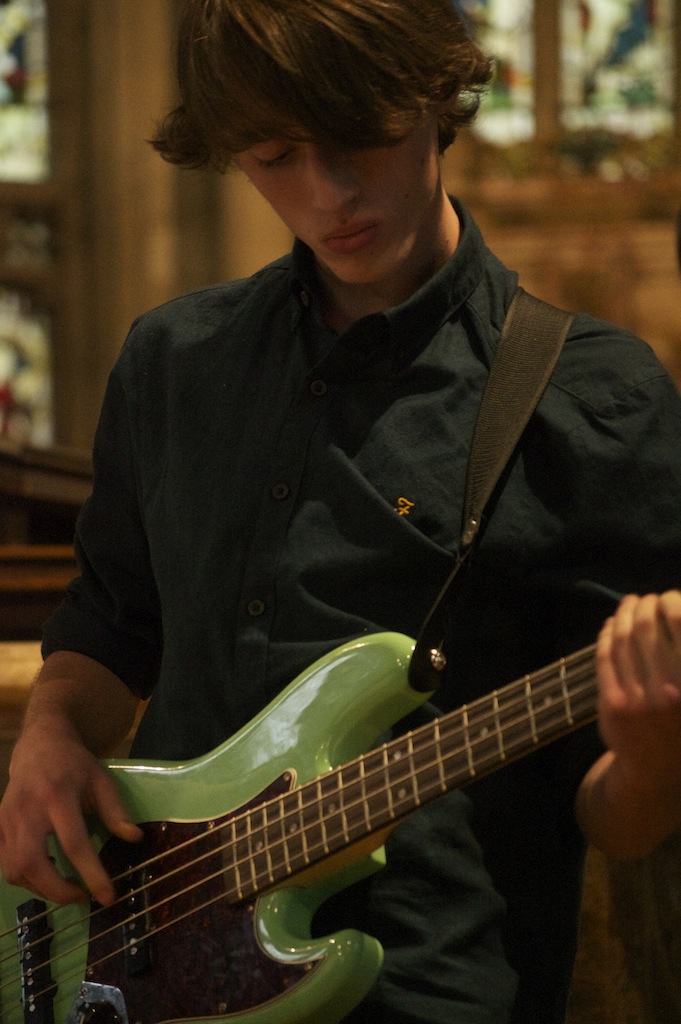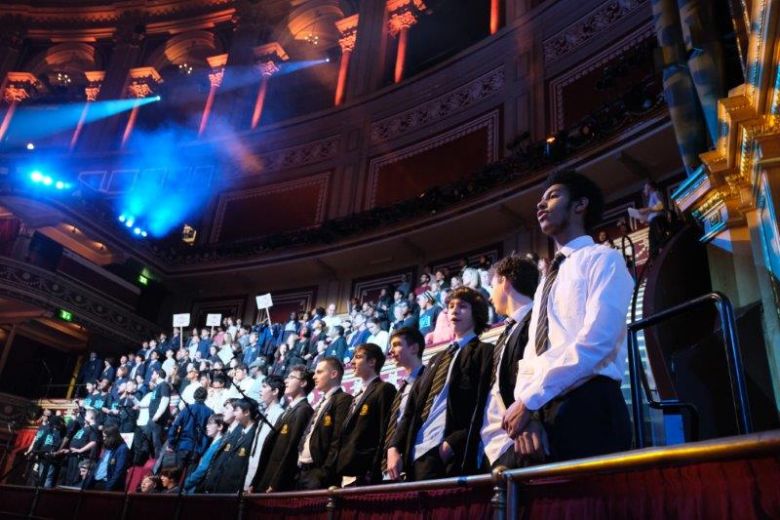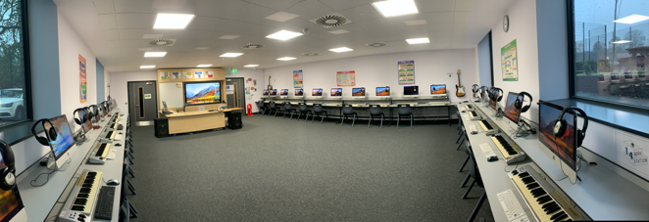
The main aims of our department are:
- To understand and explore how music is created, produced and communicated, including through the inter-related dimensions: pitch, duration, dynamics, tempo, timbre, texture, structure and appropriate musical notations.
- To learn to sing and to use your voice, to create and compose music, use technology appropriately and musically
- To perform, listen to, review and evaluate music across a range of historical periods, genres, styles and traditions, including the works of the great composers and musicians
Key Stage 3
Year 7
- The elements of Music: singing, pulse, keyboard orientation basic notation and baseline listening assessment
- Indonesian Gamelan: exploring dynamics, ensemble performing and structuring a performance (using xylophones)
- The guitar: Basic guitar orientation, singing, keyboard technique and ensemble performing.
- Instruments of the orchestra: orchestral timbres, composing and introduction to Logic software.
- Ground Bass: The bass clef, the string section, classical ensemble performing.
- Brazilian Samba: Samba drumming technique, offbeat rhythms and call and response.
Year 8
- Solo performance: Two hand piano technique and different dynamics
- Folk Music: composing a melody, ¾ time recording compositions into Logic.
- The Blues: 12 bar blues, improvisation, singing, the blues scale and guitar chords.
- Taiko Drumming: drumming technique, composing using different timbres and dynamics
- 4 chord songs: recording and arranging a pop songs on ipads, singing in harmony.
Year 9
- Band Skills: drumkit and bass guitar orientation, guitar and piano ensemble skills.
- Cover Versions: ensemble band practice, rehearsing and performing skills.
- Reggae Music: the features of reggae, performing a reggae piece and composing your own
- Film Music: composing music to reflect a scene using Logic
- Electronic Dance Music (‘EDM’): different genres e.g. house, drum ‘n’ bass etc and interesintg chord progressions.
Key Stage 4 - GCSE Music
GCSE Music

GCSE Music at William Ellis is extremely popular. Currently, we have 45 students studying Music in Year 10 and Year 11. Exam results are also outstanding:
- In 2018, 68% of students achieved 8-9 (where 8 is equivalent to an old A* and 9 is even higher). This is compared to a national average of just 18%.
- In 2017, 55% of students achieved A*/A.
All resources and homework can be found at the Music Department GCSE Music Website, which can be found here:
Key Stage 4 – GCSE Specification AQA Music
Year 10
- Western Classical tradition 1650-1910 (Hayden – Symphony 101 in D major The Clock Movt. 2)
- Popular Music (The Beatles - Sgt.Pepper’s Lonely Hearts Club Band)
- Composition to a set brief
- Ensemble Performance
- Solo Performance
Year 11
- Traditional Music (Santana – Supernatural)
- Western Classical Tradition since 1910 (Copland – Saturday Night Waltz and Hoedown)
- Free Composition
- Solo Performance
- Ensemble Performance
Assessment –
Listening Exam (40%) (1 hour 30 mins)
Section A: Questions linked to unheard works
Section B: Questions linked to set works
Performing (30%) (minimum Grade 3 standard expected) – internally marked and externally moderated.
1 ensemble piece
1 solo piece
Composing (30%) - internally marked and externally moderated.
1 composition in response to a brief
1 free composition
Further Information
All students taking GCSE Music receive a 50% discount for individual instrumental lessons. Well equipped practice rooms are available at lunchtimes and instrumental teachers run a range of ensembles in which GCSE students are expected to take part. More information about extra-curricular provision can be found here.
KS5 - Music Technology A Level

William Ellis has run the popular Music Technology A Level as part of the LaSWAP 6th Form for almost 20 years. The course is led by Mr Forbat, Head of Music, alongside Thor House a highly-regarded industry professional who also runs the website Music Tech Guru, providing Music Technology resources for students across the country.
FACILITIES
Our course is run from our brand new music facilities, completed in 2019 which contains a 25-user mac-suite and an industry-standard recording studio fitted with £10,000 of equipment provided by the Parents' Association.
To listen to some examples of our most recent student recordings, click here.
Music technology is an exception at LaSWAP, in that the AS and A Level courses are taught concurrently. This means you and choose either the 1 Year AS or 2-year A-Level course.
ENTRY REQUIREMENTS
As part of the Camden Creatives pathway at LaSWAP, we consider applications from all students who have shown high levels of engagement with Music and Music Technology during their time school. Whilst we take into account your GCSE grades (many students are on the 3 A-Levels pathway), students can combine Music Technology with other vocational courses such as Performing Arts, if they show a particular flare for Music Technology.
YEAR 12 COURSE SPECIFICATION
Component 1 (20%) Recording – students use the recording studio to record and mix a 2 minute track from a list of ten artists (e.g. All of Me, John Legend)
Component 2 (20%) Technology-based Composition – compose a 2 1/2 minute long piece of music in any style, using synthesizers and audio excerpts provided by the exam board.
Component 3 (25%) Listening – students listen to unfamiliar commercial recordings, assessing knowledge of the history of music production from 1950s until present day with emphasis upon principles of music technology.
Component 4 (35%) Producing and Analysing – students are given a selection of audio and midi tracks to edit and mix on music software.
YEAR 13 COURSE SPECIFICATION
Component 1 (20%) Recording
Students develop their mixing skills so as to record a longer track – 3 minutes.
Component 2 (20%) Technology-based Composition
Students develop their composing and technology skills so as compose a longer (3 minute) piece of music technology based on a more demanding brief set by the exam board e.g. War or Outer Space.
Component 3 (25%) Listening
Students broaden their listening skills with a greater range of unfamiliar commercial recordings, assessing knowledge of the history of music production from the 1950s until present day, with emphasis upon principles of music technology.
Component 4 (35%) Producing and Analysing
Students develop their skills of editing and mixing on music software for a selection of audio and midi tracks. The theory and physics of sound are studied so as to develop this understanding. Note that this component includes some basic numeracy.
